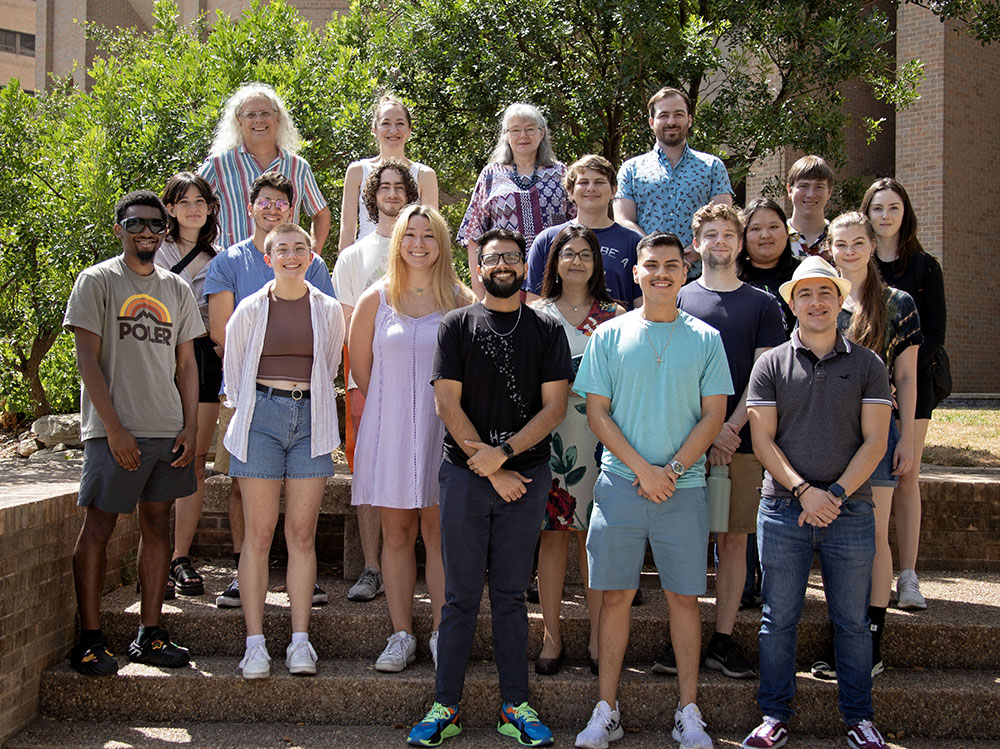UT Austin Astronomy NSF REU Program: Frontier Research and Training in Astronomy for the 21st Century
 |
| 2023 UT Astronomy NSF REU Scholars & Mentors |
Please check back mid-December 2024 for updates about the 2025 NSF REU program and how to apply.
We are pleased to announce that the UT Austin Astronomy NSF REU Program ”Frontier Research and Training in Astronomy for the 21st Century” (PI: Dr. Shardha Jogee) will run in Summer 2025 for ten weeks (end of May to early August). This is the seventh summer of our NSF REU program, and we look forward to welcoming a diverse, motivated, high-achieving group of eight scholars. The program involves a synergistic collaboration between the UT Austin Astronomy Department, McDonald Observatory, the Texas Advanced Computing Center, and the College of Natural Sciences.
Update on March 10/2024: The eight offers for our summer 2024 cohort have been accepted. We send everyone else who applied our very best wishes for admission in other programs and in your future academic endeavors. We received over 200 applications and we were unfortunately unable to admit many excellent candidates we would have loved to see in our program.
PROGRAM DETAILS: The UT Austin Astronomy Department is one of the top-ranked departments in the nation and we are committed to fostering a diverse and inclusive environment in the astronomy community at large. Our REU program aims to engage the full pool of excellence in our diverse nation and to equip students with modern skills needed to succeed in the STEM landscape of the 21st century. Students in our REU program will enjoy the following:
-
A supportive and cutting-edge astronomy research environment, where they will have the opportunity to conduct research in frontier areas of astronomy, including star formation, planetary systems science (the Solar System, exoplanets), stellar astrophysics, black holes, galaxy evolution, dark matter, dark energy, cosmology, and instrumentation.
-
Research Supervision and Broad Mentorship: REU students enjoy research supervision from internationally recognized faculty, research scientists, and postdocs. The REU director also meets students regularly for broad mentorship and professional developments activities. Additionally, graduate students provide informal mentorship.
-
Professional Development: We provide a wide variety of professional development and mentoring activities These typically include python coding, guidance to navigate the science landscape, science communication (posters, talks and papers), LaTeX workshops to write research notes and conference papers, an overview of STEM careers, an overview of how to apply for graduate programs, empowerment activities, and an end-of-program research symposium.
-
An observational astronomy module in the Department on the UT Austin campus, followed by a fully funded observing trip to McDonald Observatory (if pandemic health and safety protocols allow a visit to the observatory).
-
Access to the Texas Advanced Computing Center for modern computing techniques that drive Big Data analytics and numerical simulations
- Financial and Logistical Support: Our REU program provides very generous financial and logistical support. We cover the cost of round-trip travel from the student's home institution or residence in the USA to the UT Austin campus, on-campus housing, background checks, gym fees, poster printing, as well as a round trip to McDonald observatory (if pandemic health and safety protocols allow a visit to the observatory). We also provide an allowance of $800 per week (which includes the NSF stipend of $700 and an additional supplement) for ten weeks. This allowance is used to cover meals and other expenses. In addition, we also provide funds for REU students to attend a future professional meeting (e.g., the AAS meeting) to present their research results from our REU program.
- Post-REU mentorship and funding to attend a future professional meeting (e.g., the AAS meeting) to present their results.
- The vibrant and diverse city of Austin, which is home to eclectic and cosmopolitan music, art, culture, and food, and outdoor activities (e.g., hiking, cycling, rock climbing, and kayaking on Lady Bird Lake).
CONTACT INFORMATION: If you have any questions, please contact the Astronomy Department at 512-471-3000, or the Principal Investigator, Professor Shardha Jogee (sj@astro.as.utexas.edu).




